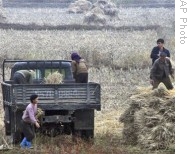VOA标准英语10月-UN Says N. Korea Food Shortage Dire
搜索关注在线英语听力室公众号:tingroom,领取免费英语资料大礼包。
(单词翻译)
Pyongyang-based senior U.N. officials are visiting the South Korean capital, to report on North Korea's ongoing1 food shortage. They say international food donations are up, and Pyongyang officials are being cooperative. But, as VOA Seoul Correspondent Kurt Achin reports, millions of North Koreans still risk serious malnutrition2 as they await a questionable3 harvest.Pyongyang-based program directors of major U.N. relief agencies painted a mixed picture of North Korea's ongoing food shortage but maintained the situation remains4 very serious.
 |
| Jean-Pierre de Margerie delivers a speech during a conference in Seoul, South Korea, 23 Oct 2008 |
World Food Program country director in the North Korean capital, Jean-Pierre de Margerie, says rising world prices for rice and basic grains, compounded with flooding last year, put many at risk in North Korea - or, as it is known, the DPRK.
"Most of the regions in the DPRK have been sliding downwards5 towards acute food and livelihood6 crisis," he said. "And some areas - those most affected7 by the crisis - are sliding to level four, which is a level of humanitarian8 emergency."
About a million North Koreans are believed to have died from hunger-related causes in the mid9 1990s during a famine brought about by North Korea's self-imposed isolation10 and economic mismanagement. Periodic flooding takes a much worse toll11 on farmland in the North than in South Korea, because rainwater flows faster down mountains stripped bare by impoverished12 North Koreans.
De Margerie says unusually heavy floods last year, and the severe shortages that followed, appear to have made North Korea more cooperative with the United Nations.
He says the WFP has expanded its North Korea operations fivefold. North Korea has allowed 59 WFP staff members into the country this year, including, for the first time, native Korean speakers. He says the organization has a much easier time monitoring food distribution than in previous years.
"We are reaching conditions, which allow us to say that we have random13 access in the field, allowing us to increase tremendously our level of confidence in terms of confirming that the food is reaching the intended beneficiary," said de Margerie.
De Margerie says unlike previous years, food shortages are affecting what he calls the North's "cereal belt", farming areas in the country's Southeast.
 |
| North Korean farmers work the fields near Pyongyang, 22 Oct 2008 |
U.N. Food and Agriculture Organization North Korea program coordinator14 John O'Dae says North Korean agriculture is not working near capacity because its equipment and infrastructure15 are too dilapidated.
"A lot of equipment - tractors, trailers - is quite old," he said. "It is in a state of poor repair. There is a lack of spare parts and tires."
More crucially, O'Dae says North Korea lacks the fuel to run its equipment, and chemical fertilizer to use in its fields. The shortages are adding to worries the North will have a poor harvest this Fall.
South Korea has not provided any direct food or fertilizer aid to the North this year due to a chill in inter-Korean relations. The U.N. aid directors are scheduled to meet with South Korean officials this week.




